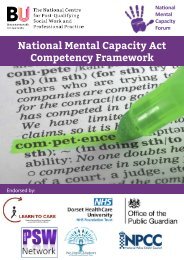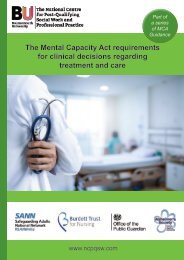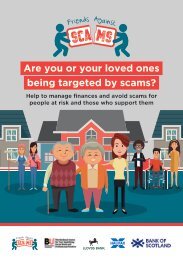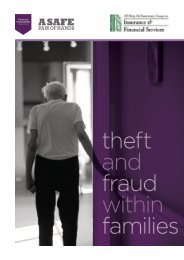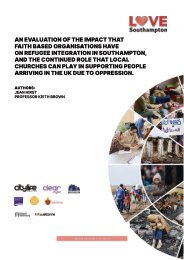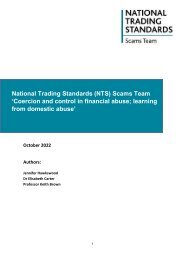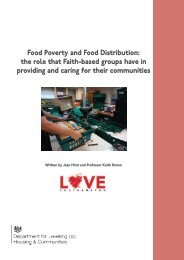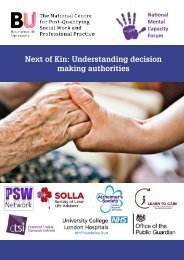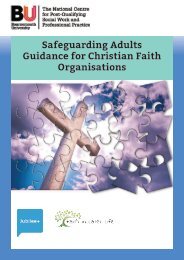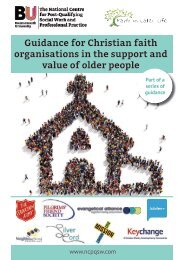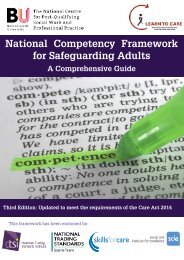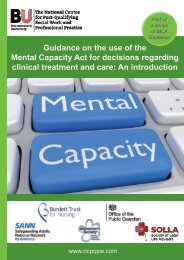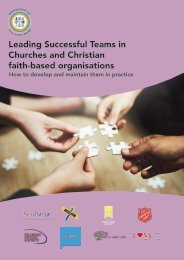Loneliness in Older People - Online
Some of the isolation and loneliness which people in the Fourth Age experience is due to the ageism in our society and in our churches. It is now time for churches to stand-up to the prejudices and discrimination of older people, to challenge the ageism we see in society and show that people in the Fourth Age are valued, celebrated, respected and included. Churches and Christian faith organisations should be leading the way to reach out to older people, to tackle ageist views and attitudes and demonstrate that older people matter.
Some of the isolation and loneliness which people in the Fourth Age experience is due to the ageism in our society and in our churches. It is now time for churches to stand-up to the
prejudices and discrimination of older people, to challenge the ageism we see in society and show that people in the Fourth Age are valued, celebrated, respected and included. Churches
and Christian faith organisations should be leading the way to reach out to older people, to tackle ageist views and attitudes and demonstrate that older people matter.
You also want an ePaper? Increase the reach of your titles
YUMPU automatically turns print PDFs into web optimized ePapers that Google loves.
Isolated Communities<br />
<strong>Older</strong> people may be isolated <strong>in</strong> the community <strong>in</strong> which they live. Rural villages may be<br />
geographically isolated, have limited transportation, with poor <strong>in</strong>ternet connections, and fewer<br />
social and health services/groups/networks. Inner city communities may have poor hous<strong>in</strong>g,<br />
poverty and deprivation, all of which are factors which may contribute to lonel<strong>in</strong>ess. Churches<br />
have often been part of the local community support for many years – for some areas, the<br />
church and church hall are the hub of a community and the only communal facility <strong>in</strong> the area.<br />
Before the <strong>in</strong>troduction of state health and social care services, churches fulfilled an important<br />
role <strong>in</strong> support<strong>in</strong>g and provid<strong>in</strong>g for the poor, disabled and housebound. As families and<br />
households have become more mobile, this role of the church with<strong>in</strong> local communities may<br />
have dw<strong>in</strong>dled; many church members travel from other neighbourhoods and some churches<br />
have less contacts and relevance for people liv<strong>in</strong>g locally. However, it is important that churches<br />
remember the important roles of pastor<strong>in</strong>g and provid<strong>in</strong>g for the local community – whether<br />
<strong>in</strong> provid<strong>in</strong>g physical resources or offer<strong>in</strong>g pastoral and spiritual care to those liv<strong>in</strong>g <strong>in</strong> the<br />
neighbourhood.<br />
With<strong>in</strong> local communities, there may be <strong>in</strong>dividuals or smaller groups of people who themselves<br />
are isolated from the neighbourhood, e.g. those from ethnic m<strong>in</strong>ority groups, people with<br />
learn<strong>in</strong>g disabilities, immigrant families, asylum seekers. For such marg<strong>in</strong>alised groups, isolation<br />
may be <strong>in</strong>creased through lack of language, other difficulties with communication, lack of<br />
understand<strong>in</strong>g or awareness of the local culture or cultural norms and social exclusion, barriers<br />
or prejudices.<br />
Wherever older people are liv<strong>in</strong>g and from wherever they have come, the local church can<br />
be a great resource and opportunity to reduce isolation and combat lonel<strong>in</strong>ess – help<strong>in</strong>g to<br />
br<strong>in</strong>g people together, reach<strong>in</strong>g out to <strong>in</strong>dividuals <strong>in</strong> their own homes and offer<strong>in</strong>g a sense of<br />
community. Remember<strong>in</strong>g to cater for potential reduced mobility, eye-sight, cognitive function<br />
and strength of <strong>in</strong>dividuals, churches can provide events and services which can create a sense<br />
of belong<strong>in</strong>g, contribution and commitment amongst older people, who may otherwise spend<br />
every day on their own.<br />
Work<strong>in</strong>g <strong>in</strong> partnership with other local and national organisations, churches can support<br />
exist<strong>in</strong>g schemes and develop new projects, relevant to the local community, which may support<br />
and meet the needs of local people, with support of organisations such as Redeem<strong>in</strong>g Our<br />
Communities (ROC), L<strong>in</strong>k<strong>in</strong>g Lives UK, Friends of the Elderly and Re-engage.<br />
19 | <strong>Lonel<strong>in</strong>ess</strong> <strong>in</strong> <strong>Older</strong> <strong>People</strong>



